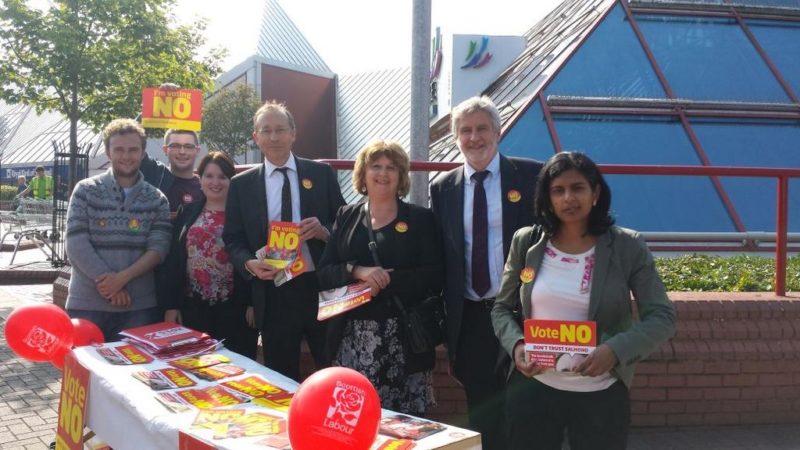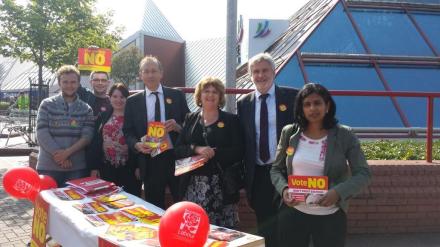
‘We look to Scotland for all our ideas of civilisation’
The French philosopher, Voltaire spoke those words about Scotland during an incredible period in Scottish history known as the Scottish Englightenment.
These words can seem strange to many people in England, as we are often guilty of seeing Scotland as a caricature, a land of deep-fried mars bars, kilts, bagpipes and unpronounceable place names. To see Scotland like this, or to see the Scottish independence movement as fueled by memories of Bannockburn and dislike of the English is to miss the point of the debates that have been taking place in Scotland in the run up to the vote on independence on the 18th.
On the 1st of May 1707 the two Acts of Union took effect and Scotland and England joined in a political union. It was an unpopular decision in Scotland; as Scottish politicians left the Scottish Parliament after voting for the Union, members of the public threw excrement at the carriages. Scotland itself had just come through a period of great social and religious upheaval; only 10 years earlier the powerful and fundamentalist Church of Scotland sought the execution of Thomas Aitkenhead for blasphemy.
However, the Scots quickly saw the opportunities granted by the Acts of Union and took full advantage of the benefits it offered. The tobacco Lords in Glasgow quickly outwitted and out-traded the English merchants, and brought new wealth to the city. Glasgow and Edinburgh universities flourished and became hotbeds of modern and revolutionary thought. Oxford and Cambridge universities were left far behind, with the great Scottish thinker, Adam Smith, saying, “In the University of Oxford, the greater part of the public professors have, for these many years, given up altogether even the pretence of teaching.” Scotland was full of political debate, and joining a debating club was seen as a mark of being a civilised person. Robert Burns formed once such club in Tarbolton in Ayrshire.
The press in England has talked about families being ripped apart by the independence movement, of bad-tempered nationalists inspired by too many viewings of Braveheart. It has failed to properly report what is actually happening in Scotland.
This week, alongside friends and colleagues from the Labour Party, I campaigned in the east end of Glasgow, and I found a country that is alive with debate. Everybody is talking about the referendum. People are talking to each other in shops, at bus stops, in cafes. The debate is lively, heated and passionate. People are talking about economics, how they are represented in Parliament, and about what kind of country they want Scotland to be. The Scots have been having these debates and discussions for months, and it seems that we in England are only beginning to notice.
 Voter registration has gone through the roof, and there is a good chance that the referendum will see more than 80% of Scots turning out to vote. Britain has not seen that kind of political engagement in decades, and it is invigorating stuff.
Voter registration has gone through the roof, and there is a good chance that the referendum will see more than 80% of Scots turning out to vote. Britain has not seen that kind of political engagement in decades, and it is invigorating stuff.
Among all Scots, even among those planning to vote No, there is a real desire for change, and a feeling that the current system in Westminster is not acting in their best interests.
I want Scotland to stay, and I want the Scots to vote No. The Scots have contributed greatly to the Union, and I believe they have benefitted from being in the Union. England would be diminished by their going.
However, it would also be a terrible outcome for Scotland, and for the UK, if the Scots vote No and nothing changes. For Westminster to go back to business as usual and to learn nothing from the debate that is happening north of the border.
The Scots recognise that a change is needed, and have been debating passionately about what shape that change should take. England needs to join in that debate. I want people in Hammersmith to be debating at bus stops about the future of their country. I want cafes in Shepherds Bush to be filled with conversations about the future of the UK.
Westminster has finally woken up to the reality of what is happening in Scotland, and to the desire for change in both the Scots and the English. I hope that the Scots vote No, and that the whole of the UK can join in their conversation about how we continue to live and thrive together as a United Kingdom. That is why the Saltire is flying from Hammersmith town hall today. Quite simply, we are better together.
Andy Slaughter is the Labour MP for Hammersmith




More from LabourList
‘As metro mayors gain power, Labour must tighten political accountability’
Letters to the Editor – week ending 22 February 2026
‘The coastal towns where young people have been left behind by Whitehall’